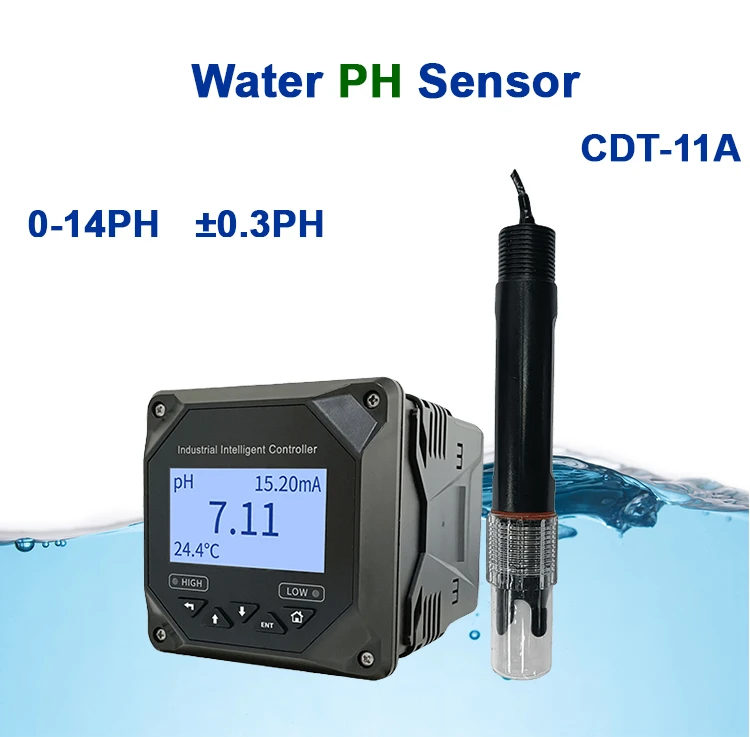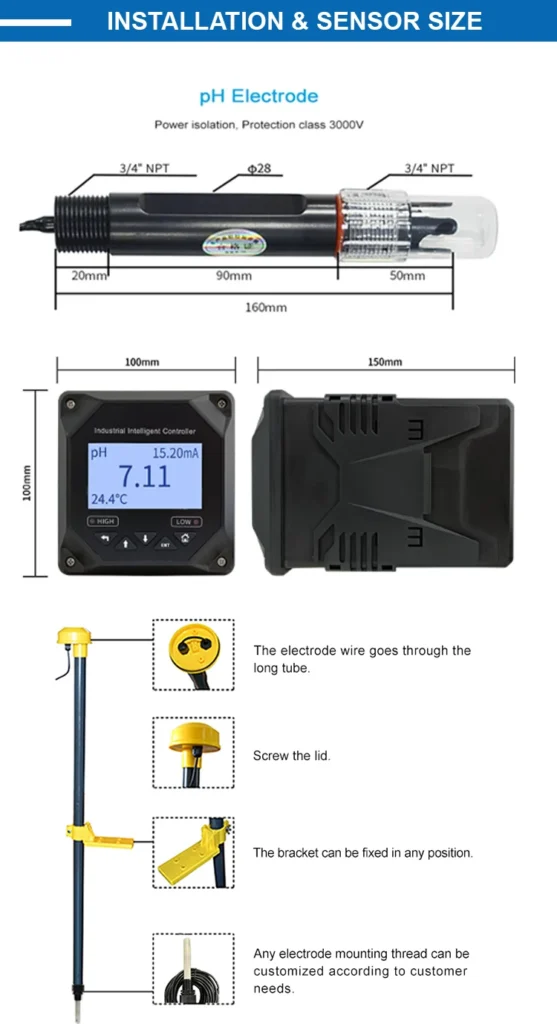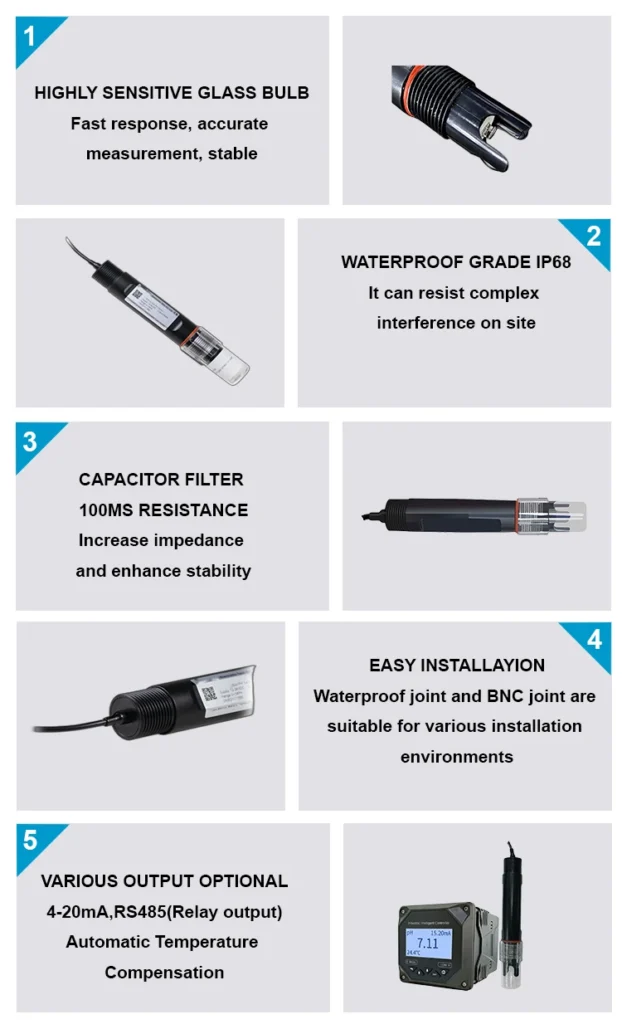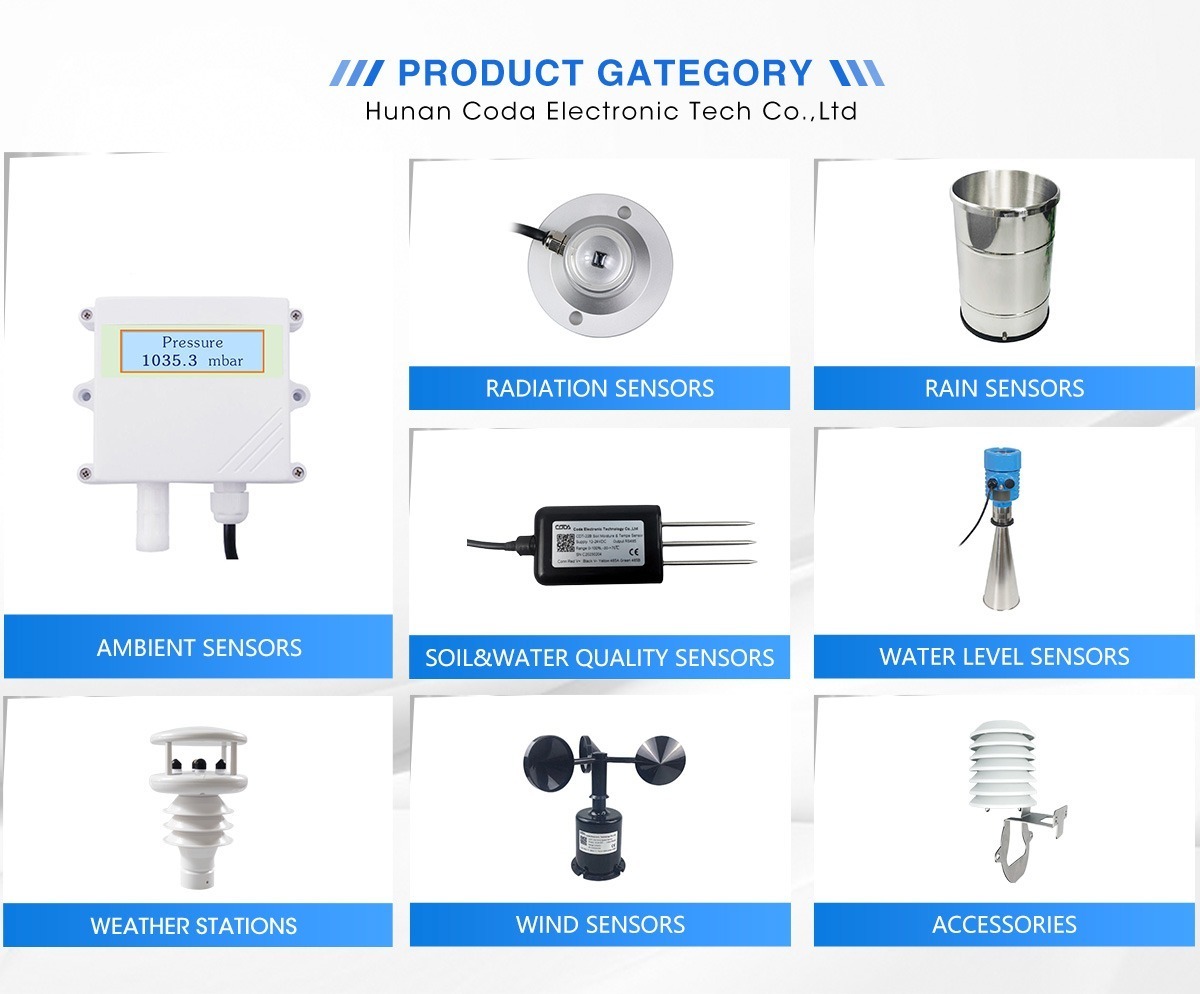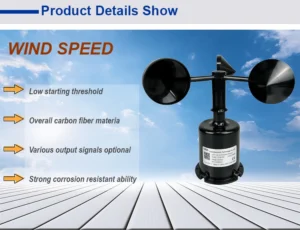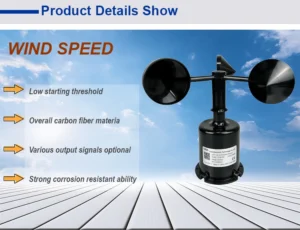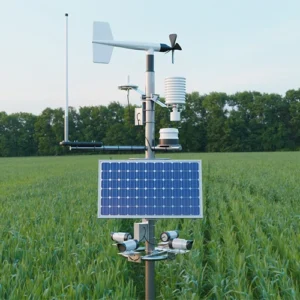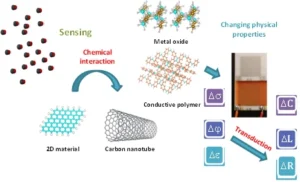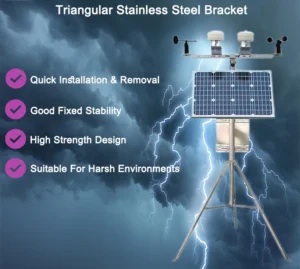Why Precise pH Monitoring with a Water pH Probe Is Essential for Wastewater Compliance
The pH level of wastewater has a big effect on its quality and the environment. The pH Monitoring balance is important in wastewater treatment. It is measured on a scale from 0 to 14. A pH of 7 means it is neutral.
Keeping pH levels in check helps biological processes and chemical treatments. If pH is too acidic or too alkaline, it can cause problems. This may lead to breaking environmental rules.
High acidity, or low pH, can help harmful bacteria grow. It can also change the taste and smell of treated water. On the other hand, high alkalinity (high pH) can lead to toxic substances like ammonia.
This can harm aquatic ecosystems and pose health risks to people who are exposed. Regularly checking pH helps make treatment systems better. This lowers risks and helps achieve good results.
The Role of pH in Wastewater Treatment and Compliance
To understand why pH monitoring is important, you first need to know what pH means and how it is measured. It measures how many hydrogen ions are in a solution. Lower amounts mean higher pH levels.
The pH scale is logarithmic. This means that a one-unit change equals a ten times change in hydrogen ion concentration.
In wastewater treatment, pH monitoring helps check how well biological processes work. This includes systems such as activated sludge and biological oxidation. These methods rely on microorganisms that break down organic matter.
Their activity is very sensitive to changes in pH. Even small mistakes in pH readings can affect these processes. This can cause bad treatment results and may break environmental rules.
Keeping up with regulatory requirements is a top priority for wastewater treatment plants. Many countries have strict rules about letting treated water go into natural water bodies.
They often set rules for pH levels. Failing to meet these criteria can lead to serious penalties. It can hurt your reputation and cause you to lose operational permits.
The Importance of Water pH Probes in Monitoring and Managing pH Levels
Water pH probes are important for accurate pH monitoring. They are very helpful in treating wastewater. These devices use various technologies, such as electrodes, optical sensors, and ion-selective electrodes, to measure pH levels accurately.
Each technology has good points and bad points. They all aim to give reliable and steady pH measurements.
A main benefit of water pH probes is that they are easy to carry and use. pH probes are better than chemical indicators. THey, they do not need regular maintenance or calibration. And They work well in many places.
They can be used in large industrial plants or small home treatment systems. Their ability to adapt makes them great for remote areas. In these places, regular pH measurement tools may not work well.
Water pH probes are portable, reliable, and precise. They are designed to work in tough conditions. This includes high heat, harsh environments, and movement.
Their strong build keeps them accurate, even in tough situations. This makes them very important for long-term use.
Obstacles in pH Monitoring: Implications for Compliance
Water pH probes have many benefits. However, some challenges can make it hard to monitor pH. This can result in not following the rules.
One main issue is calibration. Consistent calibration is needed to keep readings accurate. If we ignore this, it can lead to big mistakes.
These mistakes can lead to wrong evaluations of how well wastewater treatment works. This may break environmental rules.
Temperature changes can be a challenge. They can affect how well even advanced probes work, even those made for wide temperature ranges.
Rapid or extreme changes are common in wastewater facilities. These changes happen because of seasonal shifts or different influent sources. They can distort readings and affect performance.
Regular maintenance is important to keep pH probes accurate over time. Debris buildup, wear, or damage can affect how well they work. Routine maintenance tasks, such as cleaning and inspections, are very important. They help prevent problems and keep things running smoothly.
Neglecting accurate pH monitoring had clear consequences in a case with a wastewater treatment plant. Not meeting the right discharge criteria led to fines, harm to our reputation, and the loss of a key client. This shows how important it is to watch environmental rules closely and keep operations running well.
Advantages of Accurate pH Monitoring for Wastewater Compliance
Accurate pH monitoring provides key benefits for treating wastewater. It helps make things more efficient and saves money. A key benefit is the ability to improve treatment processes using real-time data on pH levels.
Access to this data helps operators quickly make changes. This makes sure that treated water meets all standards and works better.
Proactive monitoring helps find potential problems before they become serious issues. Finding imbalances early helps operators change chemical amounts or adjust biological systems quickly. This lowers the chance of breaking rules and reduces penalties, such as fines.
Cost savings are another important benefit. Accurate monitoring helps improve chemical use and reduce energy consumption in treatment processes. This prevents unnecessary spending.
Large operations can benefit a lot from cutting wasteful practices. For example, they can stop treating water that does not need it. This change can result in big savings.
Real-time data collection helps improve wastewater management efforts. Modern systems with advanced software and data logging allow operators to access real-time pH readings safely.
This helps them make fast choices during emergencies or when solving problems. This steady flow of information helps with ongoing improvement efforts. This means making processes better and using strategies for predicting maintenance needs.
Best Practices for pH Monitoring in Wastewater Treatment
To make the most of accurate pH monitoring, operators should follow best practices. This will help make sure their systems are dependable and correct. A key step is to properly calibrate pH probes.
It is important to follow standard calibration procedures. Regular calibrations help keep these tools accurate and dependable.
Routine maintenance of pH probes is important. This helps prevent damage or contamination. Maintenance tasks include cleaning the probes, checking for damage, and replacing broken parts.
These should be done regularly, either monthly or quarterly. The schedule depends on how often we use the equipment and the conditions it works in.
Utilizing advanced data management systems is another key factor in effective pH monitoring. Operators should invest in technologies that make it easier to store, retrieve, and analyze pH data. This may include data loggers that record pH readings in real-time. It may also include software that provides access to past data, trend analysis, and alerts for potential issues.
Employee training is very important for making pH monitoring systems work better. Operators must make sure that staff get regular training.
This training will show you how to use, calibrate, and take care of pH probes. Staff should also learn how to use data management tools. This helps staff understand pH data clearly. They can respond well to any problems that come up.
It is important to choose the right pH probe for each application. This means checking things like temperature ranges, required pH levels, and how long it lasts in the environment. Choosing the right probes helps them work well for a long time.
Comparing Traditional vs. Modern Techniques
Traditional pH measurement methods, like using chemical indicators, have been used for a long time. They are easy and inexpensive. However, these methods come with notable limitations.
Tools like litmus paper and phenolphthalein change color to show pH levels. However, they are not very precise. They can give results that are not always trustworthy, especially when temperatures change.
Modern pH probes offer a much more accurate and stable way to measure pH. Advanced technologies like ion-selective electrodes and optical sensors give accurate and reliable readings in many conditions. They are less affected by temperature changes and can work well in tough environments.
Even with their many benefits, modern pH probes still need careful attention. Regular maintenance and proper calibration are important. They help keep accuracy high.
The benefits are greater than the efforts needed. These benefits include improved reliability, accuracy, and real-time monitoring of pH levels.
Strengthening Wastewater Compliance through Accurate pH Monitoring
Accurate pH monitoring is key for following wastewater rules. It is also important for better treatment processes and for keeping water quality high. Using advanced pH probes is a good way to measure pH levels. This makes treatment more efficient and helps operators reduce costs.
Operators can get consistent and accurate monitoring results by using best practices. These include careful calibration, regular maintenance, and advanced data management tools.
Keeping a close eye on pH levels helps prevent breaking environmental rules. It also makes things more efficient by tracking and analyzing data in real time. Switching to modern pH monitoring methods helps wastewater treatment plants meet regulations and use sustainable practices in their work.
As environmental problems grow, using advanced pH monitoring tools is important for wastewater facilities. This helps them meet compliance and sustainability goals. These solutions meet today’s needs and help practices that support the planet’s long-term health and strength.
Accurate and consistent pH monitoring is key to making sure wastewater treatment systems meet strict environmental standards. This also helps global efforts for sustainable water management.
